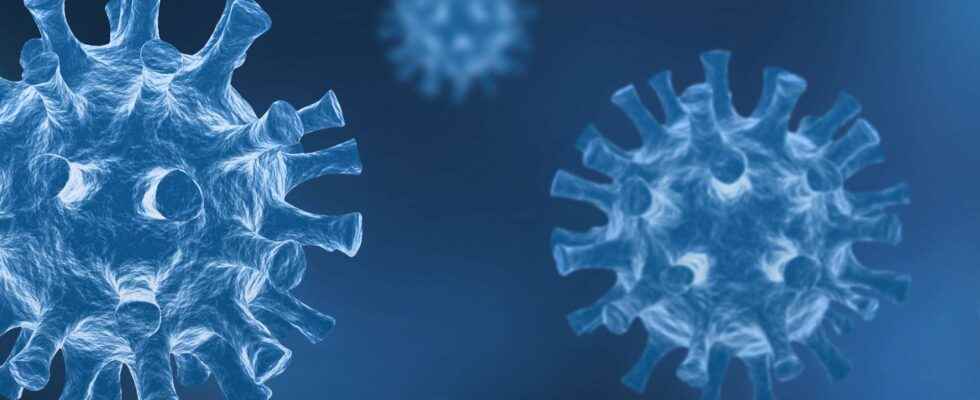You will also be interested
[EN VIDÉO] 5 questions about the Delta variant The Delta variant or B.1.617.2 variant, previously called the Indian variant, is causing concern among health authorities. How is it different? Should we be worried?
The Deltacron variant had already been talked about in early January. It would be a new variant of the coronavirusresulting from a recombination between Delta and Omicron. A Cypriot team claimed at that time to have detected 25 cases of Deltacron. Therefore, serious doubts had been expressed as to the existence of this variant. From contamination of samples had been mentioned.
This Friday, February 11, the Deltacron variant returned to center stage: the United Kingdom’s health security agency indicated that it had detected a first case of infection hybrid. This variant, under the name “Delta x Omicron recombinant”, is now part of the list of variants “under surveillance” from the British authorities. So is it really a new variant?
A simple case of co-infection?
Before speaking of a new variant, it is necessary to eliminate the other explanations, in particular the case of a co-infection. You should know that the same cell can be infected by two virus the same time. From cases of influenza and SARS-CoV-2 infections have recently been reported. At that time, we had very quickly heard of Flurona, a contraction between “flu” (the flu) and coronaviruses. However, it was not a new virus or a new variant but a patient who had been infected with both viruses at the same time. Regarding the case of Deltacron detected in Great Britain, it is very likely that the patient was infected with the Delta variant and the Omicron variant of SARS-CoV-2 the same time.
More danger?
When you think about how dangerous Delta is and how contagious Omicron is, the word Deltacron is absolutely scary! At the moment, Deltacron cases are extremely rare and the UK case is the only officially listed case. The data are therefore not sufficient to conclude on this type of hybrid contamination. However, European populations now have a good level of protection against the Delta and Omicron variants, on the one hand thanks to vaccination and on the other hand because of the high level of circulation of the Omicron variant in recent weeks. There is therefore no reason to worry about the occurrence of this new variant.
Even if the Deltacron variant does not seem to be one, the threat of the occurrence of new variants however, remains indisputable. As the Director General of the WHO stated a few weeks ago, the risk ofemergence new, more transmissible and more lethal variants is “very real”.
Deltacron: does the new variant discovered in Cyprus really exist?
Article of Julie Kern published on 01/10/22
“Deltacron” is a term that made the rounds in the media this weekend. It would be a variant of SARS-CoV-2, a mixture between Delta and Omicron, discovered in Cyprus. The real existence of this new variant is not yet unanimous.
Saturday January 8, 2021, the press agency Bloomberg published information which quickly made the media rounds. Leondios G. Kostrikis, a biochemist Cypriot and head of the biotechnology and molecular virology laboratory at the University of Cyprus, discovered a new variant of the coronavirus, resulting from the recombination between the Delta and Omicron variants. The scientist shared his discovery, called “Deltacron” on the Sigma TV channel during an interview on January 7, 2021.
The Delta variant with genetic signatures of Omicron
the genome of Deltacron would be largely similar to that of the Delta variant, but would possess Omicron-specific mutations. Leondios Kostrikis and his team claim to have detected 25 cases of Deltacron. The sequences of the latter were transmitted at Gisaid by Cypriot scientists, a database which groups the sequences of the coronavirus variants, but Deltacron is not yet part of the list of variants listed by the site.
Indeed, the discovery of Deltacron leaves many scientists skeptical. Tom Peacock, virologist at theImperial College from London, spoke on Twitter about it. For him, it is a problem of sample contamination rather than an actual recombination event.
A variant that does not exist?
Leondios Kostrikis said to Bloomberg, on January 9, 2021, that the 25 samples were not sequenced at the same time, which, according to him, excludes any technical error. Moreover, he does not believe that Deltacron is the result of the recombination between Delta and Omicron in a patient co-infected by the two variants, but rather the result of the natural evolution of an older variant.
So does the Deltacron variant really exist? It’s hard to tell from these things alone. To confirm the existence of Deltacron, other similar observations must be made independently repeatedly, and in different laboratories.
Interested in what you just read?
